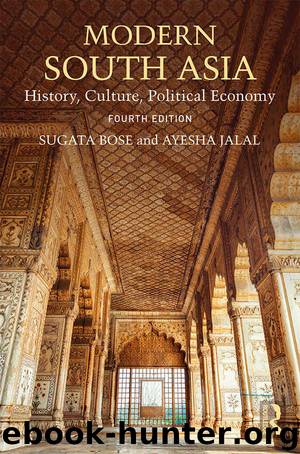Modern South Asia by Sugata Bose & Ayesha Jalal

Author:Sugata Bose & Ayesha Jalal
Language: eng
Format: azw3
Publisher: Taylor and Francis
Published: 2017-09-07T04:00:00+00:00
Figure 15.1Famine. A starving woman during the Bengal famine of 1943.
Source: Courtesy Sugata Bose from his film Rebels against the Raj: India during World War II (original footage in the archives of the Netaji Research Bureau, Calcutta).
Wartime exigencies and the experience of the Bengal famine, however, brought about a reversal of the debt relationship between metropolis and colony, as well as the nature of the links between the colonial state and the economy. Throughout the colonial era India had owed a debt to Britain, but at the end of the war it was Britain that owed a large debt of £1.3 billion to the colonial government of India. In order to provision troops and key urban classes, the colonial state had intruded into the food market, procuring grains from the countryside and selling them through ration shops in the towns and cities. Social groups such as the rich farmers of the Punjab, who might have been expected to make large profits from rising grain prices, were prevented from doing so by the colonial state’s procurement and price-control policies. The poor in one region of India, Bengal, perished on account of the state’s lack of action; the better-off in another region, Punjab, complained bitterly about the state’s heavy-handed interventions, which they deemed to be detrimental to their own interests.
It was in the context of a deepening economic crisis that the major political confrontations between nationalists and the British colonial state occurred. Radicals and socialists had always wanted to take advantage of the international war situation to advance the cause of Indian independence. It was in pursuit of this strategy that Subhas Bose had escaped from India in January 1941, having determined to subvert the loyalty of the Indian element within the British Indian army. The German invasion of the Soviet Union in June 1941 not only upset his plans of an armed invasion from the northwest, but led Indian communists to redefine what had been an ‘imperialist war’ to a ‘people’s war’ – in which they went to the extent of lending support to the British against the nationalists. This decision of the Indian communists led to a serious rift between them and the socialists within the anti-colonial movement; the latter saw Britain’s difficulty as India’s opportunity. Communists, as well as the followers of M.N. Roy, were subsequently to find it extremely difficult to live down what came to be widely viewed as their betrayal of the anti-colonial nationalist movement at a critical moment during World War II.
Japan’s defeat of Britain in Southeast Asia during early 1942, especially the fall of Singapore in February that year, emboldened even the Gandhian Congress to make more strident demands. It was to prevent the Indian nationalists from allying with the enemies of Britain that Churchill reluctantly agreed to send an emissary to hold talks with Indian political leaders. It is now clear, from British documents of this period, that both Churchill and Linlithgow, acting under pressure from Labour party constituents of the National Government and President Roosevelt of the United States, wanted to see the Cripps Mission fail.
Download
This site does not store any files on its server. We only index and link to content provided by other sites. Please contact the content providers to delete copyright contents if any and email us, we'll remove relevant links or contents immediately.
| Africa | Americas |
| Arctic & Antarctica | Asia |
| Australia & Oceania | Europe |
| Middle East | Russia |
| United States | World |
| Ancient Civilizations | Military |
| Historical Study & Educational Resources |
The Sympathizer by Viet Thanh Nguyen(4381)
The Rape of Nanking by Iris Chang(4193)
World without end by Ken Follett(3468)
Ants Among Elephants by Sujatha Gidla(3452)
Blood and Sand by Alex Von Tunzelmann(3184)
Japanese Design by Patricia J. Graham(3160)
The Queen of Nothing by Holly Black(2577)
City of Djinns: a year in Delhi by William Dalrymple(2543)
Foreign Devils on the Silk Road: The Search for the Lost Treasures of Central Asia by Peter Hopkirk(2453)
India's Ancient Past by R.S. Sharma(2441)
Inglorious Empire by Shashi Tharoor(2427)
Tokyo by Rob Goss(2423)
In Order to Live: A North Korean Girl's Journey to Freedom by Yeonmi Park(2373)
Tokyo Geek's Guide: Manga, Anime, Gaming, Cosplay, Toys, Idols & More - The Ultimate Guide to Japan's Otaku Culture by Simone Gianni(2356)
India's biggest cover-up by Dhar Anuj(2343)
The Great Game: On Secret Service in High Asia by Peter Hopkirk(2327)
Goodbye Madame Butterfly(2243)
Batik by Rudolf Smend(2173)
Living Silence in Burma by Christina Fink(2058)
